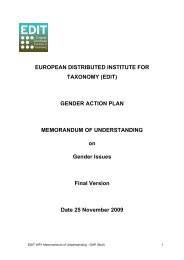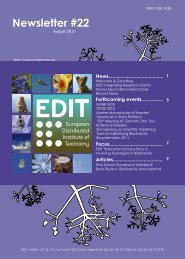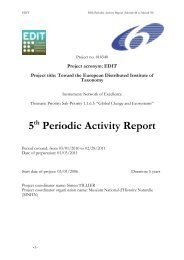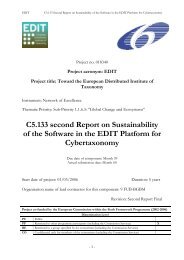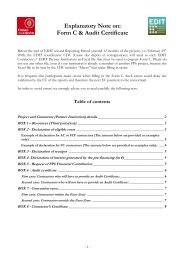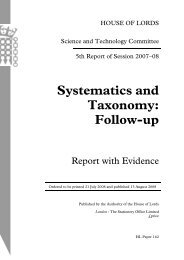Newsletter #5 - EDIT | - European Distributed Institute of Taxonomy
Newsletter #5 - EDIT | - European Distributed Institute of Taxonomy
Newsletter #5 - EDIT | - European Distributed Institute of Taxonomy
You also want an ePaper? Increase the reach of your titles
YUMPU automatically turns print PDFs into web optimized ePapers that Google loves.
Overcrowded ark<br />
In this article, the author is drawing attention<br />
to the United States’ Endangered Species Act<br />
which is currently protecting approximately<br />
1880 living species. According to the author,<br />
theact«hasbecomeunwieldy»:because<strong>of</strong>its<br />
statute <strong>of</strong> unique powerful law, it is today the<br />
chief weapon <strong>of</strong> environmentalists. They use<br />
thetexttoobtaintheclassification<strong>of</strong>areas<br />
farming and mining are greatly restricted.<br />
These restrictions lead to the loss <strong>of</strong> thousands<br />
<strong>of</strong> jobs.<br />
Detractors <strong>of</strong> the act stress the fact that<br />
since its creation 1973, only 47 species<br />
came <strong>of</strong>f the endangered list, most <strong>of</strong> because they became extinct. According to<br />
these opponents, the act is not only useless,<br />
but it may also be dangerous to the species<br />
it is supposed to protect: some people may<br />
be tempted to destroy protected species living<br />
on they land before they are discovered by<br />
biologists rather than reporting them and<br />
suffer restrictions. On the contrary, the act’s<br />
supporters think this situation demands a<br />
stronger enforcement <strong>of</strong> the law. For them,<br />
the main problem is not the harshness <strong>of</strong> the<br />
act but the fact it does nothing to help species<br />
in«criticalhabitats»inwhichdevelopment,<br />
before they become endangered.<br />
Despite this controversy only few people<br />
talk openly about scrapping the act, but at<br />
the same time it is gradually being tamed<br />
by the creation <strong>of</strong> habitat-trading schemes<br />
where compromises are considered. According<br />
to the author, imperfect as they are, these<br />
compromises represent the best hope for<br />
balancing the interests <strong>of</strong> the various parties.<br />
http://www.economist.com/displaystory.<br />
cfmstory_id=9767816<br />
One can disagree with this article, but it informs<br />
us on a particular vision <strong>of</strong> conservation that<br />
has to be considered when implementing<br />
conservation policies. This text also shows us<br />
how important it is that the communicated<br />
information is correctly understood by the<br />
concerned stakeholders. It is about explaining<br />
why saving the trivial Stock Island tree snail<br />
may be as important as saving the majestic<br />
bald eagle. And taxonomists have a role to<br />
play.<br />
matters»onthe taxonomy<br />
Find other cases studies about «Why<br />
BioNET-<br />
INTERNATIONAL website:<br />
http://www.bionet-intl.org<br />
Publications<br />
This contribution from David Williams (NHM, London) & Antonio G.<br />
Valdecasas (MNCN, Madrid) is pursuing the debate launched by<br />
B. Dayrat (please read more about this in <strong>EDIT</strong> <strong>Newsletter</strong> #4).<br />
4<br />
‘Integrative <strong>Taxonomy</strong>’ Then and Now:<br />
A response to Dayrat (2005)<br />
Authors: Valdecasas, Antonio G.; Williams,<br />
David; Wheelert, Quentin D.<br />
Source: to be published soon in the Biological<br />
Journal <strong>of</strong> the Linnean Society<br />
Abstract:<br />
Deep misunderstandings still besiege<br />
taxonomy after more than 200 years <strong>of</strong> fruitful<br />
output. It has been asserted in this Journal<br />
that taxonomy should be integrative and<br />
conform to a series <strong>of</strong> restrictive guidelines.<br />
We show that taxonomy has been integrative<br />
for most <strong>of</strong> its history, although in our sense,<br />
integrative does not mean the indiscriminate<br />
pooling <strong>of</strong> any source <strong>of</strong> data. The guidelines<br />
rationale and can have, if followed, a<br />
detrimental effect, only on taxonomy, but<br />
biology as a whole.<br />
proposedarenotfoundedingoodscientific



